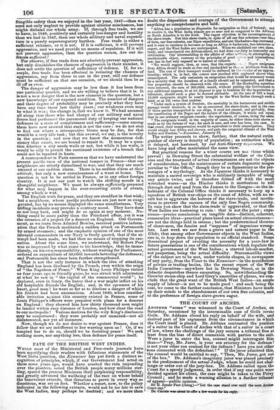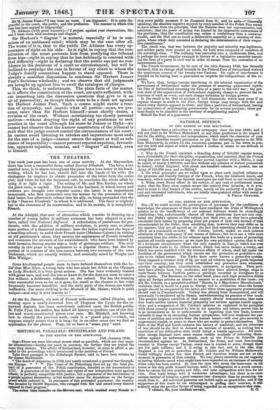THE COURT OF ARCHES.
ANOTHER "scene" was witnessed in the Court of Arches, on Saturday, occasioned by the interminable case of Geils versus Geils. Dr. Addams closed his reply on behalf of the wife, and derived part of his argument from the circumstances in which the Court itself is placed. Dr. Addams contrasted the position of a suitor in the Court of Arches with that of a suitor in a court of law, where the challenge of the jury secures a tribunal free at least from the bias of direct connexion with parties to the snit. Were a juror to enter the box, counsel might interrogate him thus—" Pray, Mr. Juror, is your son attorney for the defence? is not your other son counsel for the defence ? have you not other 'bons connected with the defendant ? " If the juror admitted this, the counsel would be entitled to say, "Then, Mr. Juror, get out of the box." Dr. Addams's imaginary juror was placed precisely in the predicament of the actual Judge, whom he could not chal- lenge or order out of the jury-box. Dr. Addams called upon the Court for a speedy judgment, in order that if any one point were decided against his client, the case might be taken to the Privy Council ; and he made a warning allusion to a further tribunal of appeal—public opinion. Sir H. Jenner Fast (rising)—"Let the case stand over until the next, Arch*
Court-day." Dr. Cartel was abed to offer a few-words for Ws reply:
Sir H. Jenner Fast—" I can hear no more. I am disgusted. It is quite dis- graceful to the court, the public, and the profession. The manner in which this case has been argued is disgracefuL"
Dr. Addams (with great warmth)—" I protest against your observations, Sir; slid I treat them with contempt and disgust."
Sir Herbert's " disgust " is natural, especially if he is con- scious of an unbiassed mind ; which may be the case after all. The worst of it is, that to the public Dr. Addams has every ap- pearance of right on his side : he is right in saying that the con- stitution of the court prevents him from purifying the tribunal from bias—right in saying that he has habitually to contend with that difficulty—right in declaring that the public can put no con- fidence in the decisions of a court so circumstanced, but will be inclined to prejudge the case in favour of any client to whom the Judge's family connexions happen to stand opposed. There is already a manifest disposition to condemn Sir Herbert Jenner Fust's decisions wholesale ; and we observe that old judgments are brought up against him to swell the catalogue of charges. This, we think, is unfortunate. The plain facts of the matter, as it affects the constitution of the court, are quite sufficient, with- out importing into the discussion questions that give to it an air of personality, as though there were to be a dead set against Sir Herbert Jenner Fust. Such a course might excite a reac- tion of sympathy, and impede what all parties—none, we pre- sume, more than Sir Herbert himself—must chiefly desire, a revision of the court. Without scrutinizing too closely personal motives—without denying the right of any gentleman to seek practice in the court although his name be Jenner or Dyke—we cannot but observe that the narrow constitution of the tribunal is such that the judge cannot control the circumstances of his court: he cannot avoid listening to rebukes and imputations most unfit for the ears of a judge—cannot secure the aspect as well as sub- stance of impartiality—cannot prevent reputed nepotism, favourit- ism, apparent injustice, scandal, and " disgust " all round, even to himself.























 Previous page
Previous page